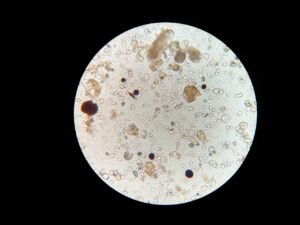Introduction
Microbes are small living organisms that are not visible to the naked eye, also known as microorganisms. They are only visible with the help of a microscope. They are abundant in number and are present almost everywhere on the Planet Earth. There are different types of microbes including bacteria, viruses, fungi, archaea, and protists. They have important roles in human health, the environment, the food industry, and agriculture. They are used in the formation of curd, wine, bread, alcohol, etc. Microbes such as bacteria are also present in the human body, help in the process of digestion, and also have many more functions.

Roles in agriculture
Microbes have a lot of benefits in agriculture. They improve soil health, increase crop yield, and enhance plant growth. Some of the benefits of microbes in agriculture are discussed below.
1: Soil Structure and Fertility
Microbes aid in forming soil aggregates, thus improving the soil structure and porosity as well. Microorganisms such as bacteria and fungi secrete extra polymeric substances, which are sticky. So, these sticky substances help in binding soil particles, forming soil aggregates. Some microbes form biofilms, which act as glue and hold the soil particles together. Microbes decompose the organic matter. During decomposition, they release important nutrients, making them available for plant use.

2: Plant Growth Promotion
In the rhizosphere, there are some bacterial and fungal communities which harbour the microorganisms which are beneficial to plant health, known as plant growth promoting microbes (PGPM). They act as biofertilizers, enhancing the nutrients availability through nitrogen fixation and solubilization of soil minerals present in soil such as phosphorous, potassium etc. Microbes also have ability to directly promote plant health. They act as phytostimulator, regulating phytohormones production such as auxins, cytokinins, gibberellins etc. The microorganisms which used to improve productivity of agriculture are Azospirillum, Burkholderia, Bacillus, Enterobacter, Pseudomonas, Flavobacterium, Rhizobium, Frankia, Clostridium, Klebsiella, Trichoderma, Serratia Beauveria, and Streptomyces.

3: Disease Suppression
When the plant is under stress, its growth is inhibited due to number of reasons. The main reasons include production of reactive oxygen species, ethylene production, lipid peroxidation and accumulation of free radicals, leading to cell death. Hence, these all results in necrosis, chlorosis, damage in photosynthetic apparatus, leaf senesence etc.
So beneficial microbes, plant growth promoting microbes, helps plant in combating the stress. Based on the negative effects of stresses, these microbes increase the nutrient availability, regulate the phytohormones and also secrete other important substances to mitigate the stress. Beneficial microbes act as biofertilizers/biocontrols, thereby reducing the need for synthetic chemicals. This help in minimizing soil and water pollution due to use of these chemical.

4: Promoting Carbon Sequestration
Microbes play important role in biogeochemical cycles i.e., nitrogen and carbon cycles. Increase in carbon concentration on atmosphere in the form of carbon dioxide increases the temperature, causing global warming. Microbes play crucial role in sequestering carbon in soil, thereby limiting its release into atmosphere. There are two pathways of sequestering carbon in soil. These are above ground plant inputs and below ground plant inputs. As compared to the atmosphere, earth’s soil hold three times more C. therefore it is an important carbon sink in fighting climate change.
Conclusion
In agriculture , microbes play an indispensable role as allies of environment and farmers. They aid plant in maintaining nutrient availability, regulating their phytohormones metabolisms and also secrete important substances when plant is under stressful condition. They act as biocontrol agents against various diseases, thereby minimizing the use of pesticides and other synthetic chemicals. This helps in promoting biodiversity, protecting beneficial insects and wildlife and mitigating the adverse effects of chemicals on environment. Microorganisms also play role in biogeochemical cycles, thus maintaining balance in ecosystem. Microbes are unseen heroes under our feets. They hold the key to thriving agricultural landscape. Therefore, embracing their potential not only improve soil health and crop yield but also pave away for sustainable future for coming generations.

